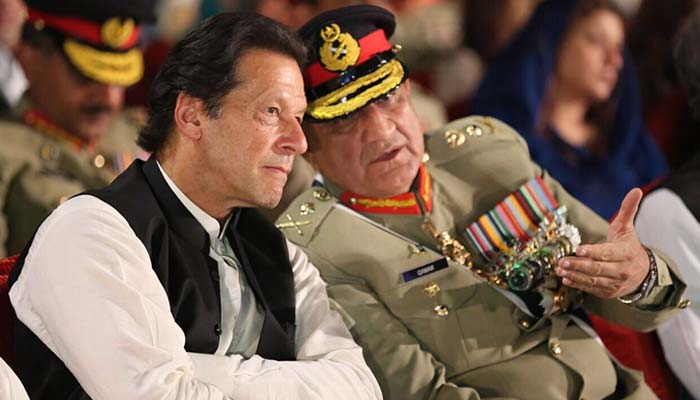
It is hilarious to see our newspapers talking of the “wide open” rift between Pakistan’s Prime Minister Imran Khan and Army Chief General QJ Bajwa, and similarly TV channels going berserk with debates inviting Pakistani participation as well – typical case of Begani Shaadi Mein Abdullah Deewana. How many such debates have we had over the developments in Myanmar in the past year? Interestingly, when Bajwa had got an extension as army chief our observations were that he would have simply ‘ordered’ Imran to sign the extension.
In the instant case, the Inter-Services Public Relations (ISPR), media arm of the Pakistan Armed Forces, announced the appointment of Lieutenant General Nadeem Ahmed Anjum as the new DG ISI on October 6. But Imran Khan reportedly wants Lieutenant General Faiz Hameed to continue as DG ISI till the situation in Afghanistan stabilizes for at least a couple of months.
Imran Khan’s political party, Pakistan Tehreek-e-Insaaf (PTI), says that the Army must send a list of candidates for the post of DG ISI to the PM for selection; that may be the laid down procedure. However, according to some security analysts, the procedure in vogue in Pakistan has been that the Army Chief together with the Corps Commanders decide on who should be appointed the DG ISI.
Pakistan’s Information Minister Fawad Chaudhry has said, “The consultations between the Prime Minister and the Chief of Army Staff on the appointment of a new DG ISI have been completed and the process for a new appointment has begun. The civil-military leadership has once again proven that all institutions are united for the country’s stability, integrity and progress.”
Fawad Chaudhry has not clarified what was the final outcome of the meeting between Imran and Bajwa but Nadeem Ahmed Anjum according to Pakistani media did not attend the recent National Security Committee. Chaudhry’s comment “that the process for a new appointment has begun” indicates the possibility that army sends a list of candidates to Imran and he approves Anjum as the next DGSI – face saver for Imran. Alternatively, Imran could choose the next DGSI other than Anjum) – a compromise suiting both.
Even before becoming prime minister, Imran was known as Taliban Khan for good reason. He probably wants Faiz Hameed to continue as DG ISI to progress negotiations with the Afghan Taliban for convincing the Tehrik-i-Taliban Pakistan (TTP) to stop attacking Pakistan. But the Pakistan army and ISI are one and same. If Faiz Hameed was talking to Taliban, it is the army that employed drones and Special Forces to help Taliban secure the Panjshir Valley.
In an editorial in the Friday Times in March 2011, Najam Sethi wrote, “The ISI has walked into GHQ and seized command and control of the armed forces”. Sethi was probably referring to the army’s hardening radical stance and use of terrorism as the state policy but the army and the ISI are equal partners in all this.
Dialogue with Taliban is no problem for it was the Pakistan army that convened the marriage between the Afghan Taliban and Haqqanis with latter having roots in Pakistan over past three decades. Mawlawi Hibatullah Akhundzada, acting Prime Minister of the Islamic Emirate of Afghanistan was deputy to Mullah Akhtar Mansour (religious teacher of Haqqani network based in Pakistan). Besides, the Pakistani army-ISI had positioned Sajuddin Haqqani, Chief of Haqqani Netetwork deputy to Mansour years back.
It may be recalled that when Asif Ali Zardari became the President of Pakistan in 2008, he ordered the ISI to be brought under the Ministry of Interior. However, within 24 hours, Zardari had to eat his words and cancel the order. For the last seven decades plus, the army has ruled Pakistan either directly or indirectly. The military has infiltrated every level of administration in Pakistan and has scant regard for the political establishment. It has a history of military coups. Nawaz Sharif was jailed and Benazir Bhutto was assassinated.
Whether the army is in power or not in Pakistan, it controls and executes the foreign and defence policies of the country. Jeff M Smith had written in Washington Times as far as April 23, 2011, “Pakistan is playing a double game… The ISI supports Islamist militants…Pakistan believes it needs a pliant, anti-Indian regime in Afghanistan and – as it has for decades – Pakistan is using Islamist militants as an extension of its foreign policy”.
But to the army’s good fortune Pakistan using Islamist militants as an extension of its foreign policy suits both China and America as far as India is concerned – with both using Pakistani proxies to further their own national interests. That is why the engagement of their militaries and intelligence services are more with the Pakistani military-ISI than with the civilian government in Pakistan.
Finally, it will make no difference to Pakistan’s policy towards India whoever becomes the DG ISI in Pakistan or Imran and Bajwa punch each other like the fracas reported in early September between Mullah Abdul Ghani Baradar and Khalil ul Rahman Haqqani. So what is the excitement about?
-The author is a veteran of the Indian Army. Views expressed are personal.








